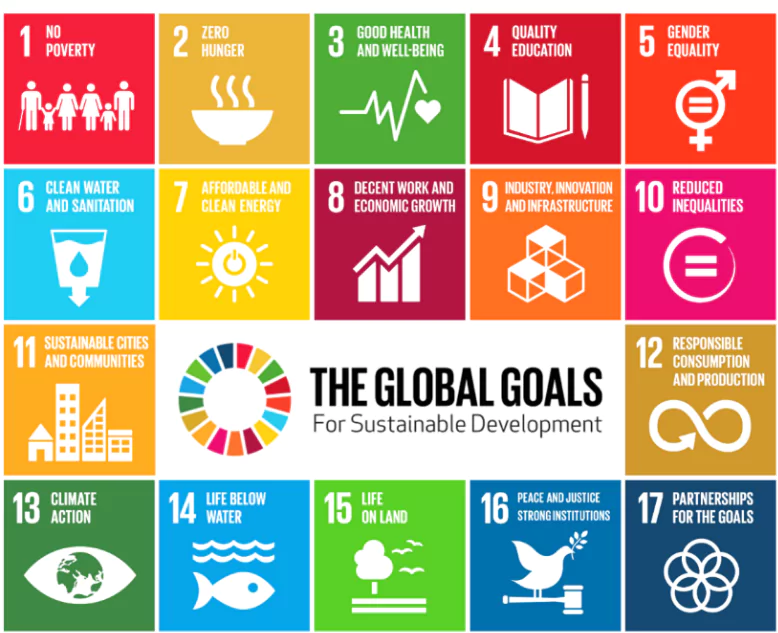Recently, Tracking SDG 7: The Energy Progress Report 2024 was released.
Organizations involved and Highlights
- This Energy Progress Report 2024 was prepared in collaboration by the International Energy Agency (IEA), the International Renewable Energy Agency (IRENA), the United Nations Statistics Division (UNSD), the World Bank, and the World Health Organization (WHO).
 This report highlighted various challenges due to which world is not on track to meet SDG 7 by 2030.
This report highlighted various challenges due to which world is not on track to meet SDG 7 by 2030.
About Sustainable Development Goal
- SDGs are also known as Global Goals.
- Adoption: Adopted by the United Nations in 2015
- The SDGs consist of 17 goals, each of which is further subdivided 169 specific targets.
- Purpose: To address major global challenges such as poverty, climate change, and health, aiming to ensure peace and prosperity for everyone by 2030.
Enroll now for UPSC Online Course
Sustainable Development
- This development involves meeting current needs without compromising the ability of future generations to meet theirs.
|
About SDG 7
- It is a Part of the 17 Sustainable Development Goals.
- It was established by the United Nations General Assembly in 2015.
- Goal: Ensure access to affordable, reliable, sustainable, and modern energy for everyone.
-
-
Key Targets
- Universal Access: Achieve universal access to electricity and clean cooking.
- Energy Efficiency: Double the rate of energy efficiency improvements.
- Renewable Energy: Significantly increase the share of renewable energy in the global energy mix.
Sustainable Development Goal & NITI Aayog Role
- Niti Aayog is a nodal institute for achieving SDGS by 2023
- The goals are poverty eradication, climate action, healthcare, education, and equality.
Roles of NITI Aayog
-
- Dual Mandate: Niti Aayong oversees the implementation and monitoring of SDGs across India.
- Apart from it, foster cooperation among Indian states and UTs.
- It assesses SDG India Index and Dashboard, Multidimensional Poverty Index, and regional indices, among others.
- Technical assistance: For smooth functioning towards SDGs, NITI Aayog engages in promoting mutual learning among states, and evaluating state and UT performances on specific SDG indicators.
|
-
Focus Areas of SDG 7
- Affordable and Reliable Energy: Ensure energy is affordable and reliable
- Renewable Energy: Increase the share of renewables in the global energy mix
- Energy Efficiency: Enhance energy efficiency
- International Cooperation: Foster global cooperation and investment in clean energy infrastructure
Check Out UPSC NCERT Textbooks From PW Store
Key Findings of the Energy Progress Report 2024
-
Increased Electricity Access Deficit
- Reversal in Progress: In 2022, the number of people without electricity increased for the first time in over a decade.
- Current Statistics: 685 million people live without electricity, 10 million more than in 2021.
- Sub-Saharan Africa: 570 million people in the region lack electricity, representing over 80% of the global population without access.
- Regional Deficit: The access deficit in Sub-Saharan Africa has worsened compared to 2010 levels.
-
Challenges in Clean Cooking Access
- Current Statistics: 2.1 billion people still use polluting fuels and technologies for cooking, primarily in Sub-Saharan Africa and Asia.
- Social Impact: Traditional biomass use forces households to spend up to 40 hours a week gathering firewood and cooking, limiting opportunities for women to work and children to attend school.
- Health Impact: Household air pollution from polluting fuels causes 3.2 million premature deaths annually.
- Environment: The use of traditional biomass for cooking has significant environmental impacts.
- Insufficient Efforts: Despite these advancements, current efforts are still not enough to achieve universal access to electricity or clean cooking by 2030.
-
Growth in Renewable Energy
- Electricity Consumption: Renewable electricity consumption increased by more than 6% in 2021, with renewables now accounting for 28.2% of global electricity consumption.
- Installed Capacity: In 2022, installed renewable energy capacity reached a new high of 424 watts per capita globally.
- Disparities: Developed countries have 1,073 watts per capita of installed capacity, which is 3.7 times more than the 293 watts per capita in developing countries.
-
Energy Efficiency Improvements
- Recent Progress: Energy intensity improved by 0.8% in 2021, slightly better than the 0.6% improvement in 2020.
- Economic Impact: The slow progress occurred despite a strong economic recovery post-COVID-19, which saw the largest annual rise in energy consumption in 50 years.
- Future Requirements: To meet the SDG 7.3 target, annual improvements need to accelerate to over 3.8% by 2030.
- Energy Efficiency: The current improvement rate is only 2.3%, which is insufficient to meet the SDG 7 target.
-
Financial Support for Clean Energy
- Rebound in Funding: International public financial flows for clean energy in developing countries increased to USD 15.4 billion in 2022, a 25% rise from 2021.
- Historical Context: This is still about half of the 2016 peak of USD 28.5 billion
Enroll now for UPSC Online Classes
India’s progress towards SDG 7
Indian initiated major initiatives to progress towards SDG 7
- Pradhan Mantri Ujjwala Yojana (PMUY): It promotes clean cooking fuel.
- National Action Plan on Climate Change: This scheme drives investment towards clean energy.
- Deen Dayal Upadhyay Gram Jyoti Yojana (DDUGJY): This scheme aims for rural electrification.
- Swachh Bharat Mission: This mission aims to end open defecation, enhance solid waste management, and establish villages free from open defecation.
- Pradhan Mantri Awas Yojana: This Yojana facilitates access to affordable housing for the low and moderate-income earners who are residents of India.
- National Clean Air Programme : This program targets to tackle air pollution problems across the country in a comprehensive manner.
|
![]() 19 Jun 2024
19 Jun 2024
 This report highlighted various challenges due to which world is not on track to meet SDG 7 by 2030.
This report highlighted various challenges due to which world is not on track to meet SDG 7 by 2030.